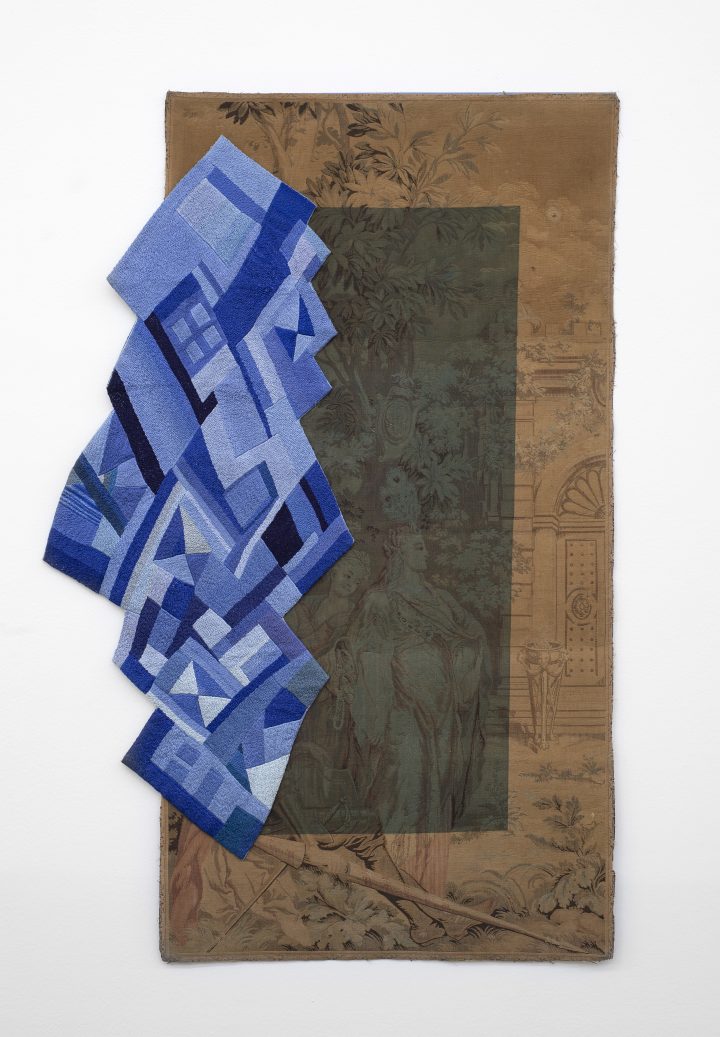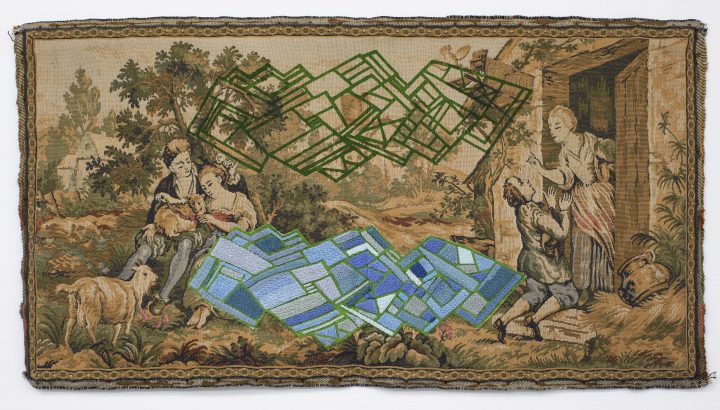




Two gray-haired, bearded men collect rags in a changing metropolis.
The image does not come from the thousands and thousands of ragpickers—chiffonniers in their mother tongue—who roamed the streets of Paris in the 18th and 19th centuries in search of discarded cloth. However, there is a family resemblance with our artists. The ragpickers made paper pulp from these rags (chiffons) for books by illustrious thinkers and damned poets. Chiachio & Giannone, instead, turn these fragments into a canvas for their polymorphous fantasies.
Buenos Aires is no longer the Paris of South America; it actually never was. It is not the capital of an expanding colonial empire, but the city of fury in a decadent world. Nevertheless, Chiachio & Giannone’s collection of rags tells a cosmopolitan story: blankets from a summer house, a Hermès scarf from another era, fake gobelins with aristocrats in wigs and high heels, a toile de jouy tapestry trafficked from the United States by the daughter of a friend, various shirts -of gay friends, of fairies, of a father who is no longer around- and so many other tidbits of gossip.
Once again Chiachio & Giannone fabulate their origins in this exhibition through this sample of textiles from the middle-class imaginary. They know more than well that all origins are mythical and that autobiography requires fiction. Surrounded by their offspring of three dachshunds, there is no term or image that may capture all of the winding roads of their queer bond, which bifurcate and ramify with each finding and encounter. Although as Chiachio & Giannone Inc. they went around the world in eighty tapestries, here they stay at home, where they receive visits from different times. The walls exhibit embroidered versions of a painting by Yente (Eugenia Crenovich), which play the part of stained glass windows of a rainbow cathedral that overlooks the pale brown exteriors of the gobelins. In the center of the exhibition hall, in between the checkerboarded floors of intimate courtyards, the queer couple nestle in their tapestries, surrounded by plants in pots of phallic columns alla Brancusi, embroidered like vases stacked with the ornamental geometry of various indigenous cultures. The person honored here is their indigenous great-grandmother, from the Comechingones tribe, whose oblivion within the family lineage ignited the desire to search for what remains and invent what is missing.
The indigenous Mapuche singer Aimé Painé used to say that through words she brought back the rags of memory, “what they have always wanted to steal from us.” She shared the philosophy of Benjamin, who found in the chiffonniers the model of the materialist historian and thus offered a key to repairing the world: to make history is not to recount great events but to gather and rejoin the debris of time, that is, to recompose the scraps of consumer society’s materialistic dreams, reassembling them with their seams exposed. For Chiachio & Giannone, the task is literal. With their rags, material traces of discarded affects, they make up a self-imagery that devours everything with an Anthropophagic appetite, like Macedonio Fernández’s tale of a pumpkin that became the cosmos. They embroider a form of soft inheritance that shelters another future while they sharpen their needles in the face of present perils.
Curator: Leandro Martínez Depietri.





